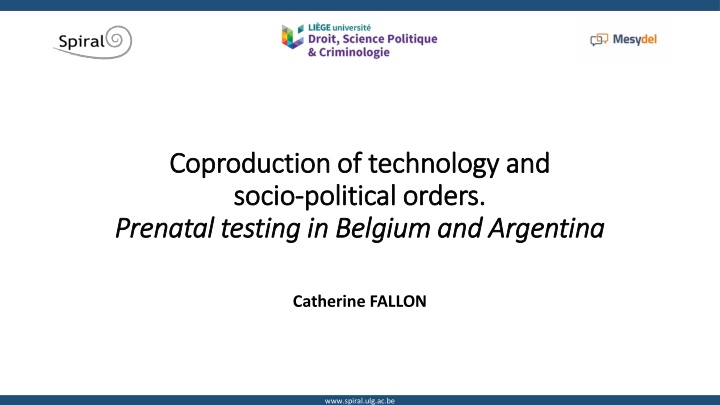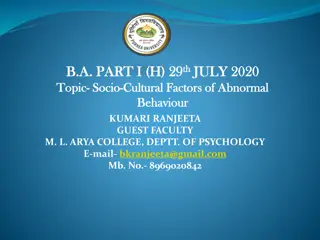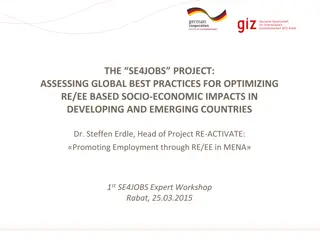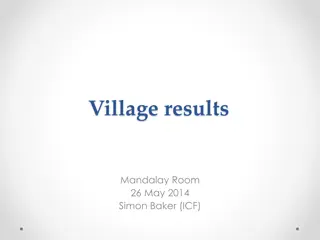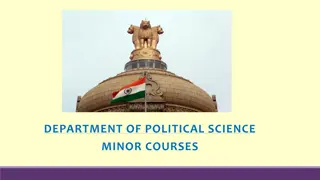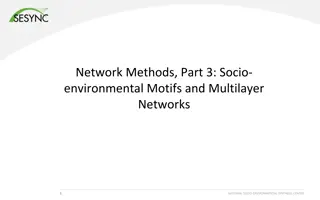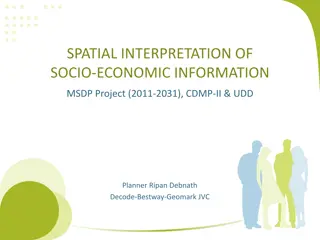Coproduction of technology and Coproduction of technology and socio-political orders.
Prenatal testing practices in Belgium and Argentina are analyzed through a co-productionist lens, highlighting the intertwined nature of technological advancements and social-political influences. The study explores how science and technology shape societal norms while being shaped by socio-political structures, impacting public policies and individual decisions in the context of prenatal surveillance.
Download Presentation

Please find below an Image/Link to download the presentation.
The content on the website is provided AS IS for your information and personal use only. It may not be sold, licensed, or shared on other websites without obtaining consent from the author.If you encounter any issues during the download, it is possible that the publisher has removed the file from their server.
You are allowed to download the files provided on this website for personal or commercial use, subject to the condition that they are used lawfully. All files are the property of their respective owners.
The content on the website is provided AS IS for your information and personal use only. It may not be sold, licensed, or shared on other websites without obtaining consent from the author.
E N D
Presentation Transcript
Coproduction of technology and Coproduction of technology and socio socio- -political orders. political orders. Prenatal testing in Belgium and Argentina Prenatal testing in Belgium and Argentina Catherine FALLON www.spiral.ulg.ac.be
Presentation Presentation 1. Co-productionist approach imported form the STS : useful for policy analysis ? 2. Prenatal surveillance apparatus in Belgium and Argentina : a mature policy 3. Co-productionist analysis of NIPT (Non Invasive Prenatal Testing - a gene- based technology) in Belgium 4. Comparative analysis with another case study in Argentina 5. Conclusion www.spiral.ulg.ac.be
1. 1. Co Co- -productionist productionist approach approach imported imported form formthe STS the STS 1. STS = discipline with a broadly constructivist understanding of S&T as a social phenomenon. ANT perspective (Latour) : socio-technical changes are indissoluble elements of the process of construction of the features of contemporary collective social life. Co-production (Jasanoff) : science as a process in constant and indissoluble interaction with political, social and technological change. : S&T makes the reality at issue visible and measurable to scientific analysis (and hence to power and control) in a performative way (as Foucault proposition of knowledge and power) Knowledge and its material embodiments are at once products of social work and constitutive of forms of social life: society cannot function without knowledge any more than knowledge can exist without appropriate social supports (Jasanoff, Designs on Nature,2005) 2. 3. www.spiral.ulg.ac.be
How How do the do the natural order and the social order develop together ? natural order and the social order develop together ? 1. S&T modify the social orders while socio-political order shapes the S&T developments 2. Jasanoff analyses the practices of government as socio-technical activities affected by the local normative institutions (law) and by the local citizens / consumers demands (private dynamics) with a comparative interpretative methodology to explore the interwoven themes of innovations and politics in the development of hybrid networks (human +non humans) in situated contexts. 3. In line with Foucault apparatus : discourse, institutions, regulations, scientific statements; techniques; .. inscribed in a play of power and supported by types of knowledge . The subject is subjected to discourse and regulation: he can also resist this normative framework in a process of subjectivation 4. How norms are embodied in technical standards and practices; in professional discourses and contributions and in public policies? What is the ST impact on public reason ? www.spiral.ulg.ac.be
2. 2. Prenatal Prenatal surveillance in surveillance in Belgium Belgiumand Argentina and Argentina ( (classic classic) ) Prenatal screening for fetal diseases is designed to inform parents of the risk of having a child with a serious anomaly (Down Syndrom - T21) . Belgium Argentina Public hospitals All mothers are tested Argentina Private practice In case of positive test, an invasive amniosynthesis is used for diagnosis If confirmed, an TOPFA is proposed (at no cost) and organised for 95% of cases If confirmed, If confirmed, As abortion is NOT legal in this case As abortion is NOT legal in this case www.spiral.ulg.ac.be
Co Co- -productionist productionist analysis of NIPT analysis of NIPT in Belgium as emerging in Belgium as emerging Users demands 1. The consumers : asked for the availability of the test (once available on Internet) 2. Medical professionals - Gynecologists propose the tests to all the women (350 euros) who can afford it - Human geneticists are working in university hospitals (genetic counselling and research) 3. Regulatory bodies : university Machines bought for - KCE : approved to finance the test at no cost for at risk women on the basis of CBA CBA RA T21 is anomality - Health Council : approved the test & questioned the ethics of choice of the target group - Committee for Human Genomics : propose to organize the tests at no cost in Belgium 1. The Federal Minister decided to make the test available to all women at 8 Apparatus : Geneticist and Genomic research reinforce their position center stage. Subjectification : all regnant women are all invited by the state/medical authority to consider the risk level of their situation : their child might not match the ST-norm. In-border genetic data Equality as a political choice www.spiral.ulg.ac.be
Co Co- -productionist productionist analysis of NIPT in Argentina analysis of NIPT in Argentina Argentina Public hospitals Argentina Private practice Gynecologists remain risk managers only for women at risk Hospital-based funding Women demand the test and pay the test Gynecologists organise the test Foreign laboratories make the test contre-conduite d irresponsabilit Women rights NGOs enter in resistance Women can enter in illegal action At the same time, NGO fight to obtain depenalisation of abortion for all women in the country. NGO inform the women about the possibility for an abortion at home (under medication). www.spiral.ulg.ac.be
Belgium Argentina Users demand OK Consumers satisfied at own cost Hospitals support gyneco. as risk managers No direct link between the professionals and the federal authority Equality of treatment More genetic infrastructure in universities (machines, databases) Nobody denies the quality of the test: the genetic information is more precise and the test improves the efficacy of the existing device. Pregnant women are all invited by the state/medical authority to consider the risk level of their situation : their child might not match the ST-norm. Hospitals patients are more prone to remain with a ir-responsable position In private practice, women take their individual responsibility and enter in resistance Who defines the anomal fetus ? What is informed consent ? What is the cost of avoiding false negatives? Is TOPFA a right or not ? www.spiral.ulg.ac.be
Conclusion Conclusion 1. Consider materiality; Consider the transformation of knowledge / power nexus in apparatus seriously Consider the transformation of the subjectification processes Consider as well indirect and pervasive cases : we have seen distinctive sets of resource distributions, and variations in opportunity and constrain : Inequalities in hospital in Argentina Inequality for the access to abortion Whether a particular structure constrains or enables a particular scientific practice and how it does so is thus an empirical question 2. 3. www.spiral.ulg.ac.be
Thank Thank you you for for your your attention attention Catherine.FALLON@uliege.be www.spiral.ulg.ac.be
